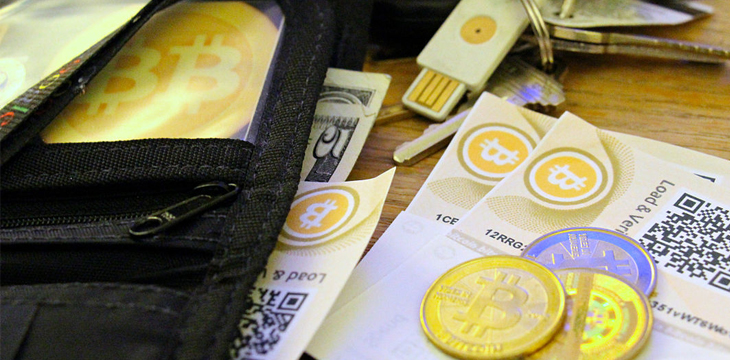Traditionally, a wallet is a small folding case for carrying paper money, credit cards, and other flat objects. And while many believe that a cryptocurrency wallet has the exact same characteristics as a traditional wallet, in reality, it functions differently.
Bitcoin lives as a record of transactions on the blockchain. Bitcoin never leaves the blockchain, so, in essence, a cryptocurrency wallet is somewhat of a misnomer as it does not store the digital currency.
Instead, your Bitcoin wallet is a tool that interacts with the BitcoinSV blockchain to send, receive, and manage the Bitcoin assigned to addresses. When a person sends Bitcoin, they are transferring possession of the coins from one address to another.
Some wallets are not linked to the real identity of the owner. All transactions from the wallet are stored publicly and permanently on the BitcoinSV blockchain. The data, such as the wallet address, can be traced to the user’s identity in several ways.
How does the crypto wallet work?
The crypto wallet stores private and public keys that interact with the BitcoinSV network. An alphanumeric identifier is generated based on the public and private keys. This identifier is commonly known as the “address” because it refers to a specific location on the blockchain. This address is what parties give to one another in order to transact using Bitcoin.
The private key stored must have ownership of the public address. To complete a Bitcoin transaction, the public and private keys must match. The transaction is signed by the sender and recorded on the Bitcoin (SV) blockchain. Once that happens, the balance of the receiver will increase, and the sender’s decreases accordingly. The private keys must never be disclosed, or else the party risks having their Bitcoin stolen.
What are the most common crypto wallets?
The majority of crypto wallets are software-based and come in many forms such as desktop, mobile, web, etc. Software-based wallets are convenient and more comfortable to transact with because by in large, they are connected to the internet.
- Web wallets such as those you will find on cryptocurrency exchanges allow you to access blockchains through a browser interface without having to download and install the software. Users can create a new wallet and set a personal password to access it. The downside is, some service providers hold and manage the private keys on the user’s behalf. In effect, the information stored on centralized servers is vulnerable to hacking.
- Desktop wallets are downloaded and operate locally on the user’s computer. Desktop wallets offer users full control over their keys and funds. While desktop wallets are considered safer than web wallets, users are still susceptible to theft if their computer has any viruses or malware installed. It is thus crucial to back up the wallet.dat file then keep it somewhere safe. If the hard drive is damaged and there is no backup, the coins are lost.
- Mobile wallets are relatively convenient and more comfortable to use in contrast to other available options. With a mobile wallet, users can check their account transactions or make in-store payments using QR scanning instantly. These properties make mobile wallets best suited for performing daily transactions. Similar to desktop wallets, mobile devices are vulnerable to malware infection and malicious apps. Users are encouraged to keep their private backup keys (or seed phrases) secure in case the smartphone gets lost or damaged.
Keeping Your Bitcoin Wallet Secure
For users looking for more security, offline hardware wallets are an alternative to their online software-based counterparts. Hardware wallets, also known as cold wallets, are the physical electronic devices that use a random number generator (RNG) to generate public and private keys. The keys are stored inside the device.
Offline storage means a virus can’t infect a hardware wallet, nor can hackers access it through an internet connection. Similar to a vault, hardware wallets are at an advantage if users are holding a large amount of the cryptocurrency. The disadvantage is that users will need to connect the hardware wallet to a computer to access their wallet, thus making them relatively less accessible.
The most secure yet least popular way to store cryptocurrency is a “paper wallet.” As the name suggests, paper wallets are printed out on a piece of paper. A software program generates a set of public and private keys. The keys are then printed on a piece of paper along with a QR code and kept offline. If the owner loses the piece of paper, they also lose access to their funds.
Using a paper wallet is relatively straightforward. Users transfer funds to the public address shown on the paper wallet. Alternatively, to withdraw or spend currency, the user needs to transfer funds from the paper wallet to a software wallet. This process can either be done manually by entering the private keys or by scanning the QR code on the paper wallet.
A significant flaw of paper wallets is that they aren’t suitable for sending funds partially, but only its entire balance at once. If a user imports the paper wallet private key into a desktop wallet and spends just part of the funds, the remaining coins will be sent to a “change address” that is automatically generated by the Bitcoin protocol. If the user doesn’t manually set the change address to one that they control, they will likely lose their funds.
Choosing the Right Bitcoin Wallet
We have examined many options available in the market today as well as their pros and cons. Each option has something unique to offer the user. Some are focused on providing security while others focus on creating easy accessibility. No one wallet covers all areas. Losing access to cryptocurrency wallets can be quite costly, so it’s important to back them up carefully.
Before choosing a cryptocurrency wallet, it’s crucial to think about how you intend to use it so you can select the most suitable wallet.
- Are you storing a large amount of Bitcoin that you don’t plan to use in the short term?
- Do you need access to your Bitcoin anytime and at any place?
- Are you trading Bitcoin for financial gain?
Ultimately, it comes down to your needs, such as how many Bitcoins you have, how frequently do you plan on using it for cryptocurrency exchanges, the amount of privacy and security you need, etc. Moreover, users can also choose to combine different wallet options to fit their needs. Whichever method requires thorough research and consideration before moving funds into the wallet.
Hungry for more? Here’s a quick guide to Bitcoin smart contracts.
Recommended for you
Tiny payments are changing the expenses landscape. Micropayments and nanopayments are not entirely new concepts and practices. But with the
You can earn money when you explore the world of Bitcoin and understand its intricacies. Once you get the hang

 03-05-2026
03-05-2026 


